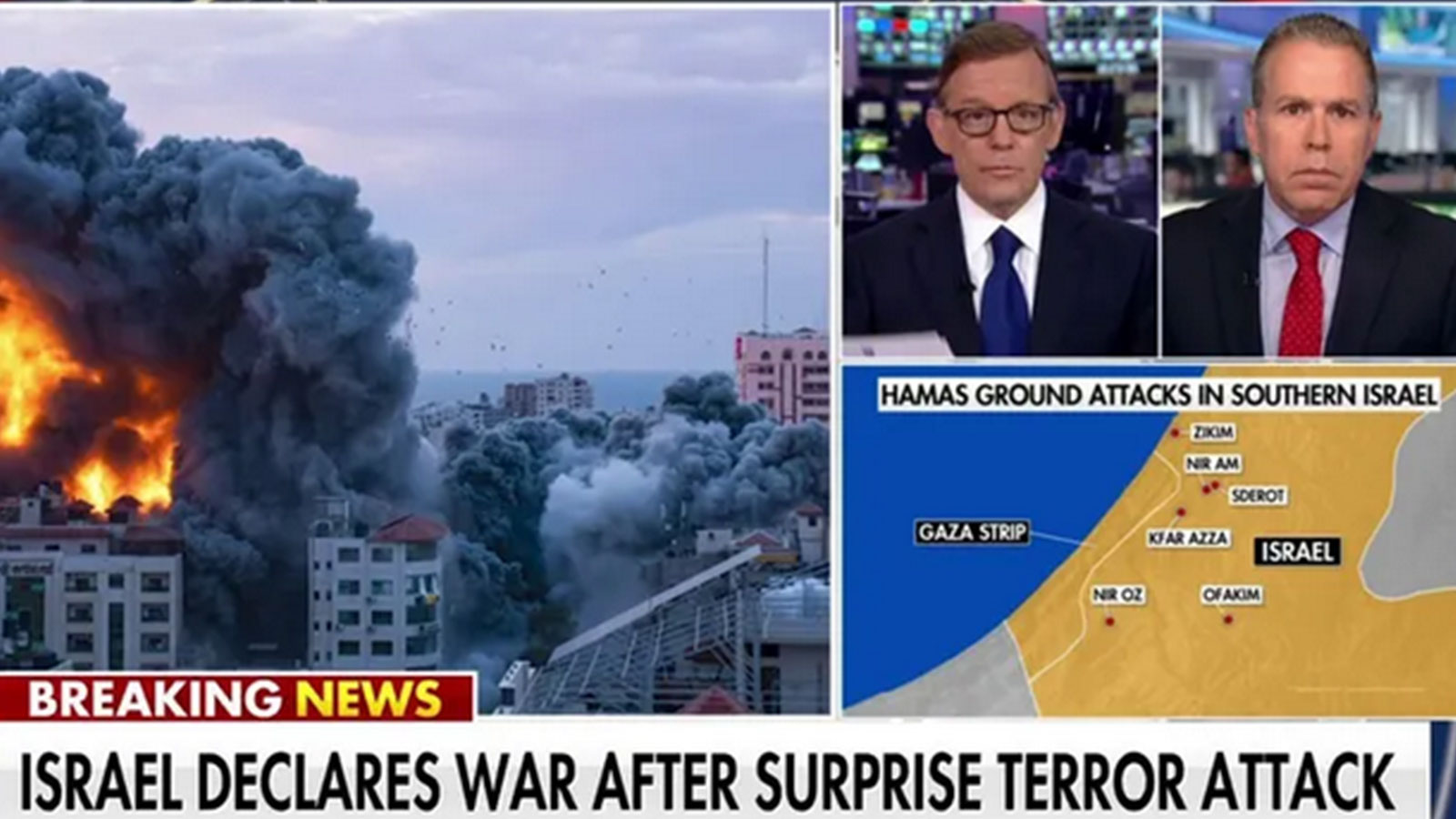If the commentary that news media outlets offer up is supposed to equip audiences to understand the world, then major US outlets’ coverage of the unfolding horrors in the Middle East are failing spectacularly. The New York Times, Wall Street Journal and Washington Post combined ran seven editorials on Israel/Palestine between October 7–9: one from the Times, four from the Journal and two from the Post.
These three days of coverage begin the day that Hamas fighters broke out of the besieged Gaza Strip to kill and take captive hundreds of Israeli soldiers and civilians, after which Israel launched yet another massive bombing campaign against the Strip, killing hundreds of Palestinian militants and civilians. At no point do these analyses provide readers with the information necessary to comprehend what is happening and why, and they consistently mislead readers about key facts.
Root causes
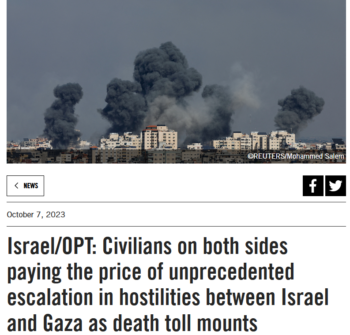
Amnesty International (10/7/23): “The root causes of these repeated cycles of violence must be addressed as a matter of urgency.”
Many credible observers have pointed to the relationship between this weekend’s escalation and Israel’s decades of mass violence against and dispossession of Palestinians. Amnesty International, for example, offered the following assessment:
The root causes of these repeated cycles of violence must be addressed as a matter of urgency. This requires upholding international law and ending Israel’s 16-year-long illegal blockade on Gaza, and all other aspects of Israel’s system of apartheid imposed on all Palestinians. The Israeli government must refrain from inciting violence and tensions in the occupied West Bank, including East Jerusalem, especially around religious sites.
Adalah, a Palestinian-run legal center based in Israel, called Hamas’ attacks “brutal and illegal,” and said that their “root causes” are
the illegal 56-year-old Israeli military occupation, the longest occupation in modern history; the killing of tens of thousands of Palestinians; the blockade on Gaza; Israel’s settler-colonial policies in the West Bank, including East Jerusalem; and the denial of the inalienable right of the Palestinian people to self-determination—as well as the total disregard by the international community of its obligations to fulfill UN resolutions.
The Israeli human rights group B’Tselem documents that since 2001, more than 10,000 Palestinians have been killed by Israeli forces. More than 2,000 of these were minors, almost a thousand of whom were children aged 13 and younger. Over the same time period, some 1,300 Israelis have been killed by Palestinians, including 145 minors, 58 of whom were 13 or under. Nearly 9 out of 10 deaths this century have been on the Palestinian side—a reality to consider when deciding whose killings are to be considered “retaliation.”
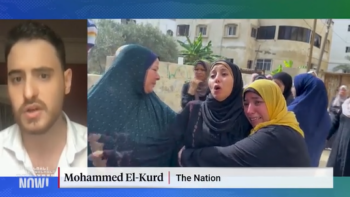
Mohammed El-Kurd (Democracy Now!, 10/10/23): Media outlets “are preemptively justifying the genocide of hundreds and thousands of Palestinians.”
Palestinian journalist and poet Mohammed El-Kurd said on Democracy Now! (10/10/23):
One wonders how much bloodshed, how much Palestinian death is necessary for people to realize that violence begets violence, and that the occupation and the colonization of Palestine, the blockade of the Gaza Strip needs to end for all of this violence to end.
An editorial in the Israeli newspaper Ha’aretz (10/8/23) noted that the current administration of Israel has established “a government of annexation and dispossession,” with “a foreign policy that openly ignored the existence and rights of Palestinians.” The paper criticized Prime Minister Benjamin Netanyahu for “overt steps taken to annex the West Bank” and “to carry out ethnic cleansing in…the Hebron Hills and the Jordan Valley.” Under the current government, the paper pointed out, there has been
a massive expansion of settlements and bolstering of the Jewish presence on Temple Mount, near the Al Aqsa Mosque, as well as boasts of an impending peace deal with the Saudis in which the Palestinians would get nothing, with open talk of a “second Nakba” in [Netanyahu’s] governing coalition.
Francesca Albanese, the United Nations special rapporteur on the Occupied Palestinian Territories, condemned all attacks on civilians, and also called Palestinian violence a result of “decades of oppression imposed on the Palestinians, brutalization, structural violence, of course punctuated also by eruptive violence.”
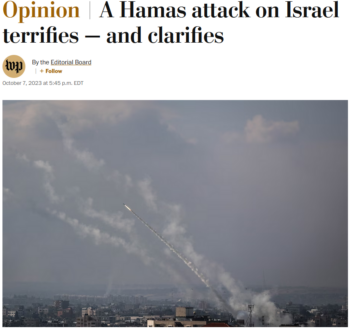
Washington Post (10/7/23): The attack “clarifies” in that “we now know just how audaciously Iran and its proxies might act to preempt negotiations among the United States, Saudi Arabia and Israel.”
Lack of context
As Ari Paul pointed out (FAIR.org, 10/11/23), the top US editorial boards downplayed or outright ignored the Netanyahu government’s expansionist policies.
They also declined to offer any of the broader historical context that’s urgently necessary to understand the causes—and therefore paths to resolution—of the current violence in Israel/Palestine.
The closest the Washington Post came was when its first editorial (10/7/23) alluded to “the legitimate Palestinian grievances that Hamas is exploiting.” Yet the paper gave no indication of what these are, omitting such foundational elements of Israel/Palestine as the 1947–48 Nakba, through which Israel created a Jewish majority by ethnically cleansing 750,000 Palestinians, and refusing to let them return to their homes despite their UN-stipulated right to do so. That history directly connects to contemporary events, in that approximately 2.1 million people live in Gaza—the territory that Hamas governs, and from which Palestinian fighters emerged on Saturday—and 1.7 million of these persons are Palestinian refugees.
Knowing these details would give readers a much more comprehensive picture of the recent killings in Israel/Palestine, but the Post editorial abstracts them into the vague, dismissable category of “legitimate Palestinian grievances.”
Without ‘immediate provocation’
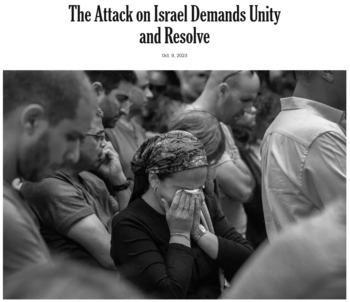
The New York Times (10/9/23) endorses giving “America’s full support for Israel,” even as “the Israeli government is cutting off power and water to Gaza,” which “will be an act of collective punishment”—but only “if it continues.”
he New York Times editorial (10/9/23), on the other hand, didn’t mention that Israel has done any harm to Palestinians at all, asserting that Hamas fighters “burst through border fences without warning or any immediate provocation.” Setting aside that the barrier is a prison fence and not a “border” (+972 Magazine, 5/17/18), the word “immediate” is doing quite a lot of work here.
The UN noted in August that Gaza residents have
been living under collective punishment as a result of the [Israel-imposed] blockade that continues to have a devastating effect as people’s movement to and from the Gaza Strip, as well as access to markets, remains severely restricted. The UN secretary general has found that the blockade and related restrictions contravene international humanitarian law, as they target and impose hardship on the civilian population, effectively penalizing them for acts they have not committed.
Food security in Gaza has deteriorated, with 63% of people in the Gaza Strip being food insecure and dependent on international assistance…. Access to clean water and electricity remains at crisis level and impacts nearly every aspect of life. Clean water is unavailable for 95% of the population. Electricity is available up to an average of 11 hours per day as of July 2023. However, ongoing power shortage has severely impacted the availability of essential services, particularly health, water and sanitation services, and continues to undermine Gaza’s fragile economy.
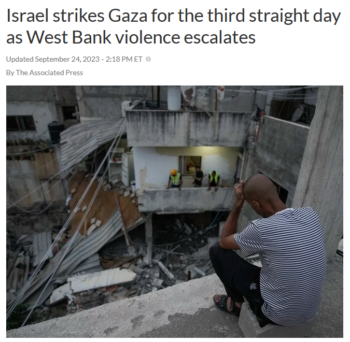
NPR (9/24/23): “Israel has been carrying out stepped-up military raids, primarily in the northern West Bank, for the past year and a half.”
Furthermore, at the end of August, Human Rights Watch said that “the Israeli military and border police forces are killing Palestinian children with virtually no recourse for accountability.” On September 23, the Israeli human rights group B’Tselem reported that Israeli government policies and government-condoned pogroms carried out by settler groups have displaced at least six West Bank communities. The group called this
an illegal policy that implicates Israel in the war crime of forcible transfer…. a choice the [Israeli] apartheid regime is making in order to realize its goal of maintaining Jewish supremacy in the entire area between the Jordan River and the Mediterranean Sea.
In late September, Israel bombed Gaza for several days in a row (NPR, 9/24/23). Israeli settlers stormed the Al Aqsa Mosque complex, one of Islam’s holiest sites, days before the Hamas attack (Al Jazeera, 10/4/23). The Guardian (10/4/23) also reported on evidence of Israel shooting Palestinian protesters at the Gaza fence just prior to the Hamas onslaught. From January 1, 2023, to October 4, the Israeli military killed 234 Palestinians and rendered 821 Palestinians homeless through housing demolitions.
Such actions would seem to meet the threshold of both “immediate” and “provoca[tive].”
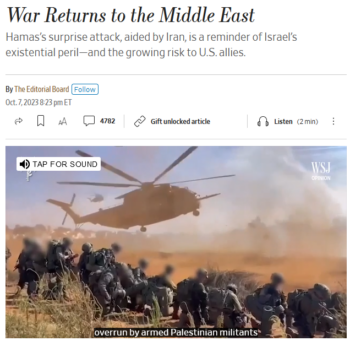
Wall Street Journal (10/7/23): “Saturday’s assault from Gaza shows the reality of the global disorder that is expanding by the month.”
‘No more condemnation’
The Journal’s editorials went even further than those the Post and Times offered, not only neglecting to situate Palestinian violence but outright denying that Israel oppresses the Palestinians. Their first editorial of the weekend (10/7/23) admonished: “Please no more condemnation of Israel’s ‘blockade’ or ‘occupation.’ Israel has been allowing 17,000 Gazans to work in Israel each day.” The scare quotes suggest that Israel isn’t actually occupying Palestinian land or blockading Gaza.
The UN, however, considers Gaza and the West Bank, including eastern Jerusalem, to be occupied territories. On August 30, the United Nations General Assembly Committee on the Exercise of the Inalienable Rights of the Palestinian People issued a study that “lends its weight to the growing body of evidence that Israel’s belligerent occupation of the Palestinian territory is illegal.”
Moreover, the United Nations’ Office for the Coordination of Humanitarian Affairs (OCHA) recently noted:
Since the imposition of the blockade in 2007, the Israeli authorities have restricted the entry into Gaza of goods they consider having a dual (civilian and military) use, such as building materials, certain medical equipment, and some agricultural items.
Such measures, the OCHA pointed out, “continue to hinder access to livelihoods, essential services and housing, disrupting family life and undermining people’s hopes for a secure and prosperous future.”
Observers who are serious about wanting an end to violence against civilians would consider its causes. The Times, Journal and Post have shown that they are not up to the task.
Source: FAIR

